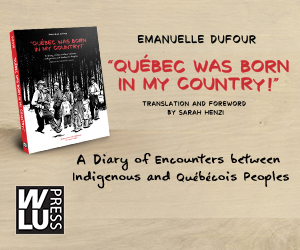canada 150: the indian act and neechie hustle
By Neal McLeod
First of all, I would like to say that I am honoured to be the writer in residence for Open Book this month. I love the idea of a digital residency and the flexibility that this affords to a writer like myself who lives in a rural area.
I am writing this blog on the 150th birthday day of Canada. I respect those who celebrate this day, and respect this, but at the same time I think they we should also think about the legacies of Canada especially from Indigenous perspectives. In particular, I am thinking about how the various governmental policies have affected Indigenous people. One such policy was the Pass System which was implemented from the time of ê-mâyahkamikahk (where it went wrong) which is referred to in English as the Northwest Rebellion. The Pass System was put in place because of the paranoia that English Canadians had of Indigenous people, particularly in the west, and particularly of nêhiyawak (Plains Cree people).
In Neechie Hustle, the Senator, along with his friends, feel the weight of the restrictions of life on the reserve. They dream of the world beyond the boundaries of the reserve, and imagine the world beyond. What sustains them throughout this period of restriction and oppression is the imaginative power of the older stories. The Senator draws upon these older stories to tell new ones, and to also make sense of the situation that he finds himself and those around him in, and to think beyond it. This reminds me of how my Cree family told stories. nicâpân (my great-grandfather), Peter Vandall, told epic stories along side stories, and often interwoven, with those of contemporary times. Thus, in this way, âniskwâcimowin (interconnecting stories) is an ongoing, forever occurring process.
In the story arch of Neechie Hustle, the Senator and his friends derive a plan to leave the reserve. Their plain is to build a rocket ship to leave the reserve and to be able to live freely. The project of building the ship brings the group together and provides them an opportunity to challenge the Indian Act and Pass System, and to move beyond it. The Senator, and his friends, demonstrate creativity and resilience.
In Neechie Hustle, the characters think beyond the limitations of the pass system- they think beyond the limitations of the situation that they find themselves in. The Senator, and his friends, demonstrate a resistance to the pass system and other repressive policies that they face in their everyday lives. Actions such as the Senator help us realize that the land and the narrative memory of the land that is now called "Canada" in English is much older than 150 years. The stories, language, medicines and songs of nêhiyanâhk are like deep roots upon which other stems and branches , such as those coming from âkayasimowin (English) emerge and grow.
Your CanLit News
Subscribe to Open Book’s newsletter to get local book events, literary content, writing tips, and more in your inbox
note: there is no capitalization in Cree
The views expressed in the Writer-in-Residence blogs are those held by the authors and do not necessarily reflect the views of Open Book.
Neal McLeod is Cree (having grown up on the James Smith reserve in Saskatchewan) and Swedish. He studied at the Swedish Art Academy at Umeå. Neal has exhibited his art work throughout Canada including the 2005 exhibition au fil de mes jours (in my lifetime) at Le Musée National des Beaux-arts du Quebec which was remounted at the Museum of Civilization in 2007. Neal’s first book of poetry entitled Songs to Kill a Wîhtikow, was nominated for several Saskatchewan book awards including Book of the Year in 2005. It was nominated for Book of the Year at the Anskohk Aboriginal Literature Awards, and won the Poetry Book of the Year by unanimous decision of the jurors.
In 2007 Cree Narrative Memory was published, which was nominated for book of the year at the Anskohk Aboriginal Literature Awards. In the fall of 2008, he published his second book of poetry entitled Gabriel’s Beach. He also recently published Indigenous Poetics in Canada (Wilfrid Laurier University Press) for which he received the Gabrielle Roy Prize for literary theory and criticism. The following books by Neal McLeod are available: mitêwâcimowina: Indigenous Science Fiction and Speculative Storytelling (Theytus Books), 100 Days of Cree (University of Regina Press), and cîhcêwêsin: new poetry from indigenous saskatchewan (Hagios Press). He is also working on: the life story of Noel Starblanket (Cree leader), a book of poetry called The Book of Ayâs, a retranslation of Plains Cree Texts, and a history of the Piapot Cree First Nation. Neal currently lives in Kinistino, Saskatchewan.


